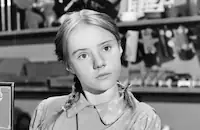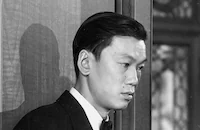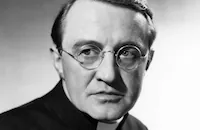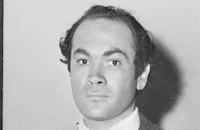The Keys of the Kingdom

Brief Synopsis
Cast & Crew
John M. Stahl
Gregory Peck
Thomas Mitchell
Vincent Price
Rosa Stradner
Roddy Mcdowall
Film Details
Technical Specs

Synopsis
In 1938, Monsignor Sleeth is about to conclude a week-long visit to the Tweedside, Scotland parish of elderly priest Francis Chisholm, whom he considers unfit. Chisholm asks Sleeth to reconsider his recommendation that he be forced to retire, and reminds Sleeth that he was boyhood friends with Bishop Angus Mealy, who ordered the investigation. Sleeth asserts that Chisholm's sermons are too eccentric, but Chisholm, who has been home for only a year after decades of service as a missionary in China, wishes to remain in Tweedside with his ward Andrew. When Sleeth retires for the night, he finds Chisholm's diary and begins to read: In 1878, Chisholm is a young boy who is loved by his fisherman father Alex and mother Lisbeth. The Catholic Alex has difficulties in the Protestant village, however, and one night, he is attacked. As Lisbeth helps her wounded husband home, they are drowned in a raging river, and Chisholm goes to live with Alex's cousins, Polly and Ned Bannon. Polly and Ned provide the boy with a stable home, and as he grows up, Chisholm falls in love with their daughter Nora. Despite Chisholm's profession of love, Nora fears that he will become a priest, as Polly wants, and when he returns to college with Angus and bids farewell to his best friend, atheist medical student Willie Tulloch, Nora despairs. Chisholm continues his studies but is mystified by a letter from Polly asking him not to come home during the summer. Finally Chisholm learns that Nora, heartsick at her imagined abandonment, has given birth to an illegitimate daughter. Chisholm rushes home but Nora dies before his arrival. Accepting his vocation, Chisholm becomes a priest, but fails at his first two positions. His advisor, Reverend Hamish MacNabb, encourages Chisholm to become a missionary, and soon the young priest sets off for the village of Pai-tan in the Chekkow province of China. Upon his arrival, Chisholm is greeted by the hypocritical Hosannah and Philomena Wang, who storm off upon Chisholm's warning that he is not interested in the "rice Christians" who attend church only to receive an allotment of rice. Alone, Chisholm struggles to build his mission, until one day he is joined by Joseph, a young Chinese Catholic. Joseph aids Chisholm in his labors and they soon receive a box of medical supplies from Willie. Later, Mr. Pao appeals to Chisholm for help with Chia-Yu, the child of the local mandarin, Mr. Chia. Chisholm goes to Chia's lavish home and tends to Chia-Yu, whose infected arm requires surgery. Chisholm's medical treatment cures the lad, but he gently refuses Chia's offer to convert to Christianity, saying that he cannot accept a soul in exchange for services rendered. Instead, Chia gives him a land grant and the materials and labor with which to build a fine mission. After two years the mission is completed, and nuns Mother Maria Veronica, Sister Martha and Sister Clotilde arrive to start a school. Maria Veronica, the daughter of an aristocratic Austrian family, looks down upon the humble, unworldly Chisholm and rebuffs his attempts at friendship. Chisholm is impressed by her competence, however, and the mission flourishes. When the Wangs return, they trick Maria Veronica into trusting them, despite Chisholm's warnings, and rob the sisters. Maria Veronica is still reluctant to trust Chisholm, and her suspicion of him deepens upon the arrival of the atheistic Willie. During Willie's visit, a war between imperial and revolutionary forces begins, but Chisholm refuses to abandon the mission. He and Willie aid the wounded revolutionary soldiers in the village, but when they learn that the church has been shelled, they rush back. On the way, Willie is mortally wounded, and Maria Veronica is shocked by Chisholm's refusal to force Willie to accept God as he dies. At great risk to himself, Chisholm blows up the cannon of the imperial forces, and the war ends. Soon after, Angus, now a monsignor, visits and expresses displeasure at the burned-out church and Chisholm's plain lifestyle. The contrast between the pompous Angus and the humble Chisholm finally makes Maria Veronica understand how truly good he is, and after Angus departs, she begs Chisholm's forgiveness for her harshness. Chisholm easily forgives her, and with help from Maria Veronica's wealthy family, their church is rebuilt. Ten years pass as the two become friends and work hard to guide their flourishing parish. One day, Chisholm learns of the arrival of Methodist missionaries Dr. Wilbur and Agnes Fiske, who are surprised by the sincere welcome they receive from their Catholic "rival." The time eventually comes for Chisholm's return to Scotland, and although he anticipates meeting Nora's grandson Andrew, his heart aches at the thought of leaving his beloved China. Maria Veronica and Joseph can barely bid farewell to their great friend, and at the dock, Chisholm blesses the many people who have come to wish him well. Back in Scotland, Sleeth finishes reading Chisholm's diary by the light of dawn, and as he prepares to leave, he confesses impinging on Chisholm's privacy. Chisholm is flattered by Sleeth's attention to his "ineffectual" life, but Sleeth sincerely tells the older man that he feels honored to have met him and assures him that he will be allowed to remain at Tweedside.

Director

John M. Stahl
Cast

Gregory Peck

Thomas Mitchell

Vincent Price
Rosa Stradner

Roddy Mcdowall

Edmund Gwenn

Sir Cedric Hardwicke

Peggy Ann Garner

James Gleason
Jane Ball

Anne Revere
Ruth Nelson

Benson Fong
Leonard Strong
Philip Ahn

Arthur Shields
Edith Barrett
Sara Allgood

Richard Loo
Ruth Ford
Kevin O'shea
H. T. Tsiang
Si-lan Chen
Eunice Soo-hoo
Dennis Hoey

Abner Biberman
J. Anthony Hughes
George Nokes
Hayward Soo Hoo
Joseph Kim
Richard Wang
James Leong
Moy Ming
Frank Eng
Oie Chan
Clarence Lung
She Wing Soo Hoo
Beal Wong
Eugene Louie
Ruth Clifford
Conrad Binyon
Crew
James Basevi
Otto Brower
Bonnie Cashin
James B. Clark
William Darling
Eugene Grossman
Ralph O. Hammeras
Roger Heman
Wei Fan Hsueh
Frank E. Hughes
Nunnally Johnson
F. E. Johnston
R. A. Klune
Thomas Little
Paul Lockwood
Joseph L. Mankiewicz
Joseph L. Mankiewicz
Arthur Miller
Alfred Newman
Albert R. O'hara S.j.
Wilfrid Parsons S.j.
Guy Pearce
Edward Powell
Frances Richardson
Fred Sersen
Edward Snyder
Murray Spivack
J. O. Taylor
Vinton Vernon
Helen Webb

Film Details
Technical Specs

Award Nominations
Best Actor
Best Art Direction
Best Cinematography
Best Music, Original or Comedy Series
Articles
The Keys of the Kingdom
There's almost a built-in contradiction in the spectacle of Hollywood's huge studio apparatus being hitched to the story of a religious vocation doggedly pursued with simplicity, humanity and integrity in the face of vicissitudes ranging from war to spiritual compromise. But it's surmounted by the straightforward honesty and unadorned integrity in reaction shot after reaction shot of Peck in close-up, cementing his career-to-be playing characters of unswerving rectitude and decency, this time as a Catholic priest, Father Francis Chisholm. Although Chisholm describes himself as stumbling and inadequate in his journal that frames the film and ends it in 1938, he unwaveringly follows his conscience and follows his heart, during nearly four decades as a missionary in China.
Like A.J. Cronin, upon whose novel The Keys of the Kingdom is based, Father Chisholm is Scottish, with a Catholic father and a Protestant mother. Orphaned young by anti-Catholic violence, he makes his way into the priesthood. Although never deviating from keeping the faith, the young priest brings to it Cronin's sense of astringent skepticism. Completely impolitic, it soon becomes apparent to his wise Bishop (Edmund Gwenn) that Chisholm's virtues are best utilized abroad, in this case rural China. Soon after arriving, his lancing of the wound of a mandarin's son wins him a powerful friend, who donates land and labor to build a new mission to replace the dilapidated one at which he arrived.
When the mandarin offers to convert to Catholicism out of gratitude, however, Father Chisholm says thanks, but no thanks, that it only really counts if you believe in your heart. So it goes during the next few busy decades. Comporting himself with kindness and humility, Father Chisholm attracts a loyal following from among the peasants whose lives he betters with education and medical treatment.
The latter involves meeting up with his best boyhood friend, Willie Tulloch, now a medical doctor and self-proclaimed atheist. As played by the ever-endearing Thomas Mitchell, Willie warms the film, helps combat diseases and pestilences, and provides yet another way for Father Chisholm to cause the Church's higher-ups to take a dim view of him when he proclaims, upon Willie's death, that there is surely room in heaven for such an atheist. Earlier, the low priority he places on political correctness is tartly expressed when he observes that the Christian is a good man, but the Confucian has a better sense of humor. Like Cronin, Father Chisholm clearly takes the view - which does not help his ecclesiastical career -- that the Catholic Church is not uniquely equipped to offer salvation.
Of course the point is that he doesn't see his priesthood as a career, but as a calling. Father Chisholm also locks horns with the stern Austrian aristocrat Reverend Mother in charge of the two nuns who arrive to teach and help administer the clinic. Rosa Stradner (an Austrian actress married to Joseph L. Mankiewicz, the film's producer and co-scriptwriter with Nunnally Johnson) plays this formidable figure, all too aware she has arrogance issues, authoritatively yet with humanity. She and Peck have the film's most moving scene, toward the end, when, reading his journal entry for the day before he is about to return home to Scotland, he describes the deep regard he has developed for her abilities and devotion. She, while maintaining all proper distance, responds in a speech of extreme delicacy, describing how she has grown to appreciate and respect him, too. The restraint is part of what makes it touching.
In fact, the measure of the spirituality of Father Chisholm's superiors can be measured by their regard and appreciation of him. Certainly, Gwenn makes us feel he was a good choice as bishop because of his ability to read people's hearts. Cedric Hardwicke, appearing as a cleric in the film's framing scenes, makes his brief screen time count, too, as he convincingly expresses a new respect for the humble priest after sitting up all night reading his journal.
The Keys of the Kingdom falters only in its two-dimensional performance by Vincent Price, as Father Chisholm's boyhood friend and fellow Catholic, whose worldliness and careerism never hide a smugness that accompany his rapid rise through the Church hierarchy, and does more than hint that the less spiritual you are, the easier you play the power game. Clearly, he's too close to power and worldliness to ever have it occur to him to bring up sins of pride when confessing. He, naturally, thinks of Father Chisholm, who towers above him spiritually, as a loser.
Again and again, one is impressed by the depth of talent on studio rosters of the time, in this case 20th Century-Fox. Not just Gwenn, Mitchell, Hardwicke, and Price, but James Gleason, Roddy McDowall (Chisholm as a boy), Peggy Ann Garner, Anne Revere and Benson Fong dot the cast list in this solidly crafted film - measured, stately, patient, never loud or pounding (except when the mission is caught in a war between imperial and nascent republican troops, and Father Chisholm briefly takes up arms!). It would have to be because it's essentially a film about interiority translated into service, a film of cumulative increments. Given the time it was made, it of course goes nowhere near the imperialist implications of its well-meaning agenda. The bottom line is that The Keys of the Kingdom and Peck convince us they're about a man in a cassock spending his life trying to do the right thing.
Producer: Joseph L. Mankiewicz
Director: John M. Stahl
Screenplay: Joseph L. Mankiewicz, Nunnally Johnson; based on the novel by A.J. Cronin
Cinematography: Arthur Miller
Art Direction: James Basevi, William Darling
Music: Alfred Newman
Film Editing: James B. Clark
Cast: Gregory Peck (Father Francis Chisholm), Thomas Mitchell (Willie Tulloch), Vincent Price (Angus Mealey), Rosa Stradner (Reverend Mother Maria-Veronica), Roddy McDowall (Francis Chisholm, as a boy), Edmund Gwenn (Father Hamish MacNabb),Sir Cedric Hardwicke (Monsignor at Tweedside), Peggy Ann Garner (Nora, as a girl), Jane Ball (Nora, as an adult), James Gleason (Rev. Dr. Wilbur Fiske), Anne Revere (Agnes Fiske), Ruth Nelson (Mrs. Chisholm, Francis' mother), Benson Fong (Joseph).
BW-137m.
by Jay Carr

The Keys of the Kingdom
Quotes
Trivia
Notes
The opening title card of this film reads: "Twentieth Century-Fox presents A. J. Cronin's The Keys of the Kingdom." A written epilogue reads, "'And I will give to thee the keys of the kingdom of Heaven'.....Christ to Peter." Throughout the film, narration of "Monsignor Sleeth" reading aloud from "Father Francis Chisholm's" diary is heard. Although Richard Loo's character is referred to as "Lieutenant Shon" in contemporary and modern sources, he is called "Major Shen" in the film. A condensed version of Cronin's novel appeared in the July 1942 issue of Ladies Home Journal.
According to information in the MPAA/PCA Collection at the AMPAS Library, in May and August 1941, M-G-M, Twentieth Century-Fox and producer Frank Vincent expressed interest in purchasing the rights to Cronin's book before it was bought by David O. Selznick. On October 6, 1941, New York Times reported that Selznick, who had purchased the property for $100,000, would cast Ingrid Bergman as "Maria Veronica" and release the film through United Artists, of which he had just become a partner. Modern sources report that Rosalind Russell also read for the part of Maria Veronica, and that Cronin was one of the writers who worked on the film's screenplay for Selznick. According to a Hollywood Reporter news item, Selznick was going to start shooting the film in mid-February 1942, with Bergman, Jennifer Jones [who was then known as Phyllis Walker] and Shakesperean actor Maurice Evans.
In January 1942, Hollywood Reporter announced that Selznick intended to start production in mid-May, and other Hollywood Reporter news items in February and March 1942 noted that Sir Cedric Hardwicke was to be tested for the role of "Father Fitzgerald" [a character that does not appear in the completed film]; K. T. Stevens, Burgess Meredith and Gene Kelly would be tested; Jones was set for the part of "Nora"; Alan Marshal had been given a role; and that Franchot Tone was testing for the role of "Father Francis Chisholm." Among the many actors who were considered for the role of Chisholm, according to contemporary sources, were Evans, Spencer Tracy, Dean Jagger and Orson Welles, while modern sources note that those considered included Kelly, Henry Fonda, Joseph Cotten, Alan Ladd, Edward G. Robinson and Van Heflin.
On September 17, 1942, Hollywood Reporter noted that Selznick's production plans were "temporarily stymied" due to his inability to find the right actor to play Chisholm, and that he was considering making an "outside deal," similar to the one he made with M-G-M to have Clark Gable star in Gone With the Wind. The news item reported that if Selznick did offer the distribution rights to the property in exchange for the services of a male star, the loan-out of Bergman and Jones would be stipulated.
In late September 1942, Hollywood Reporter announced that Selznick would be selling The Keys of the Kingdom and the rest of his literary properties and personal contracts to Paramount, but the deal was not struck. In mid-November 1942, Selznick instead sold The Keys of the Kingdom, the script of Jane Eyre and the rights to Claudia to Twentieth Century-Fox. The sale included the services of Bergman in addition to several other Selznick contractees for other projects. [For more information on the sale, please see the entry above for Claudia.] A November 1942 Twentieth Century-Fox press release announced that Nunnally Johnson would produce the picture in addition to writing the script, and a April 16, 1943 Hollywood Reporter news item noted that the picture had been placed on the "directorial schedule" of Alfred Hitchcock, who was one of the Selznick artists loaned to Twentieth Century-Fox.
After Johnson left Twentieth Century-Fox, the project was turned over to Joseph L. Mankiewicz, who substantially rewrote the script. According to modern sources, Johnson protested Mankiewicz' attempt to receive sole onscreen writing credit, and after arbitration, the Screen Writers' Guild decreed that Mankiewicz and Johnson would share onscreen billing. The Keys of the Kingdom was the only picture produced by Mankiewicz for Twentieth Century-Fox, although he did write and direct numerous films for the company.
The Twentieth Century-Fox Records of the Legal Department, located at the UCLA Arts-Special Collections Library, contain an June 8, 1943 letter from Selznick's lawyer, Daniel O'Shea, to studio attorney George Wasson, stating that Twentieth Century-Fox had been released from its obligation to star Bergman as Maria Veronica due to the studio's inability to start shooting by a previously agreed upon date. O'Shea specifically cited as problematic the lack of a director and leading man for the project, and noted that the script did not yet have a big enough role for Bergman. The February 4, 1944 issue of Tidings, a Catholic newspaper, reported that both Geraldine Fitzgerald and Rosa Stradner, who eventually won the role, were tested for Maria Veronica. Stradner, who was married to Mankiewicz, had not appeared in a picture since the 1944 Columbia production Blind Alley.
A June 1943 Hollywood Reporter news item noted that Dana Andrews was "reported to be under consideration" for a top role in the film, and in late July 1943, it was announced that Gregory Peck had been signed to play Chisholm. According to a January 14, 1944 Hollywood Reporter news item, Lillian Bronson was tested for the role of "Aunt Polly." The February 1944 Tidings news item also noted that Mary Anderson and Trudy Marshall were the "chief contenders" for the role of "Nora," and that Ethel Griffies had been signed to play "Mrs. Glennie" and Helen Craig was assigned the role of "Rosa." Although Anderson and Craig are listed on Hollywood Reporter production charts, they do not appear in the finished film. Several contemporary sources include Griffies in the film's cast, but the legal records reveal that scenes featuring Griffies and the following actors were cut before the picture's release: Pedro de Cordoba (Father Gomez); Morton Lowry (Thad); Robert Barrat (Willie's father); Terry Kilburn (Willie as a boy); John Herbert Bond (Malcolm Glennie); and Lumsden Hare (Mr. Glennie). Although Hollywood Reporter production charts include Aubrey Mather and Maxwell Hayes in the cast, Mather did not appear in the completed picture, and Hayes's appearance has not been confirmed. Edmund Gwenn was borrowed from M-G-M for the production. Many contemporary news items commented on the picture's approximately $3,000,000 budget, the studio's highest of the year.
The property came under heavy scrutiny by the PCA, which, in 1941, strongly cautioned the prospective buyers of Cronin's novel that it possessed three major difficulties: the negative characterizations of numerous priests; the treatment of Catholic beliefs and practices such as an episode in which a priest endorses a woman's false claim that her child has exhibited signs of the stigmata; and possible problems with the portrayal of war-lords, pestilence and famine in China. The book received harsh criticism from Catholic reviewers upon its publication, and the PCA file indicates that a number of religious figures and organizations were opposed to the production of a film based on Cronin's work. In discussing the potential problems with Selznick, PCA official Joseph I. Breen advised him to obtain the services of religious and Chinese technical advisors. Jesuit priests Albert R. O'Hara, who had served as a missionary in China, and Wilfrid Parsons worked extensively with Selznick, and with Twentieth Century-Fox. Breen specifically recommended that the services of Father John J. Devlin be obtained, as Los Angeles Archbishop John J. Cantwell had officially appointed him as the Church's technical advisor on motion picture production.
According to modern sources, Father Devlin was consulted. In February 1944, Breen received a letter from T. K. Chang, the Chinese Consul, who strongly urged that the Chinese village and peoples not be portrayed as they had in the book, which he described as a "serious distortion." Modern sources disclose that the Chinese village sets were specifically designed to appear orderly and clean to avoid giving any offense to the Chinese government. Upon its release, The Keys of the Kingdom was approved by the Legion of Decency, a Catholic organization, as unobjectionable for general audiences, with the reservation that it contained "statements by the leading character, the priest, which are susceptible to meaning not in accordance with Catholic doctrine."
Ronald Colman and Ann Harding appeared on the November 19, 1945 Lux Radio Theatre broadcast of the story. In the March 22, 1947 Saturday Evening Post "The Role I Liked Best" column, Peck cited Chisholm as his favorite role because of its "range and variety." Peck received his first Academy Award nomination for Best Actor for the film, although he lost to Ray Milland in The Lost Weekend. The Keys of the Kingdom also received Academy Award nominations for Best Art Direction, Best Cinematography (both for black and white) and Best Music (scoring of a dramatic or comedic picture).














